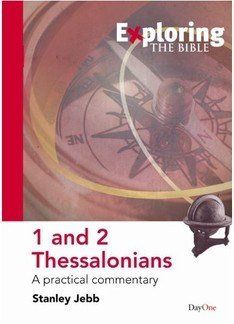Exploring the Bible: 1 and 2 Thessalonians
Stanley Jebb
DayOne
248 pages £8.00
ISBN: 978-1-84625-287-7
Star Rating: 4
The appropriate sub-title of this book is: ‘A practical commentary’. Using a carefully chosen mixture of his own scholarship and pastoral insights, mixed with well chosen quotations from other commentators, the author moves briskly, but thoroughly, through the text.
The introduction sets the style and pace for the book, providing clear background information to the letter in a condensed and readable way.
Throughout, the content of the book is helpful, but one or two things are worthy of special mention. There is an excellent treatment of the ‘signs of true conversion’ based on 1Thessalonians 1: 6 – 10 (p.33 – 39). Then, there is the way Dr. Jebb, having commented on a passage, stops to pick up and develop some particular theme or application. e.g. ‘How not to be a witness’ and ‘How to be a witness’ based on 1 Thessalonians 2: 1 – 12 (p.56 – 62)
There is an excellent and well-balanced coverage of the subject of ‘love’ based on 1 Thessalonians 3: 12 (p.85 – 87). The book is packed with the observations of the experienced pastor. e.g. There are some helpful thoughts on God’s will based on 1 Thessalonians 4: 3 (p.98) where we read: ‘It is not an opposing force we have to cope with but a power on which we can depend.’ And, when writing on the problem of false teaching based on 2 Thessalonians 2: 1 – 2 (p.177), Dr. Jebb notes that: ‘while false doctrine may be received in a moment, its effects may be felt for a long time.’
As would be expected in a commentary on 1 and 2 Thessalonians, ‘the day of the Lord’ is a key feature, and again, Dr Jebb’s treatment is balanced and timely. He works his way through the text, being careful to expound only what the Apostle Paul teaches and reveals.
Four subjects are briefly considered in the Appendix. ‘The meaning of ‘heart’ in scripture’, The theme of deception in the New Testament’, ‘The Last Things’, ‘The Question of Alcohol’. They are interesting, thought provoking and, maybe, a little controversial. But all worth reading and add to the value of the book.
Stephen Emmott
Mirfield




